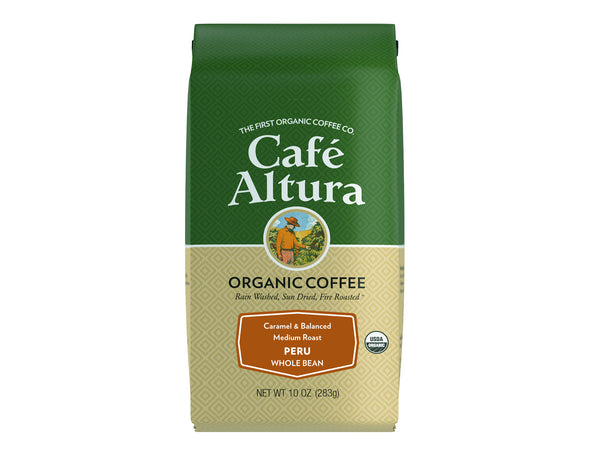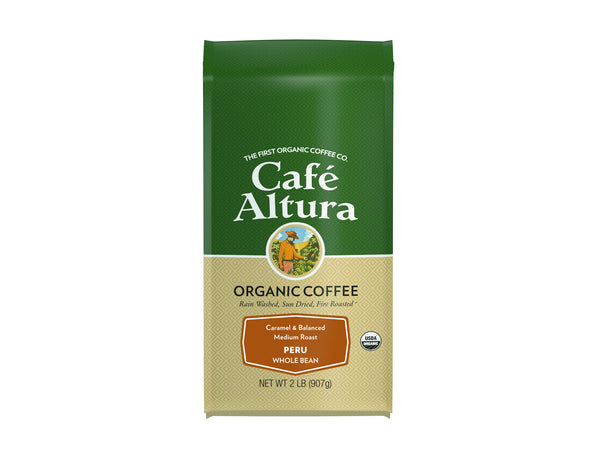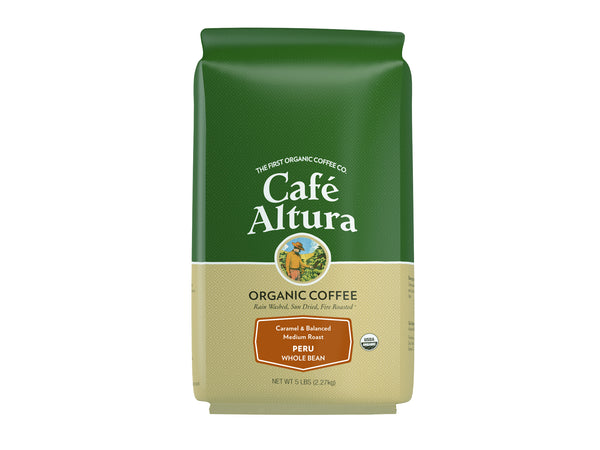Peru Medium Roast
One of our most well-rounded offerings, Café Altura Peru is a seasonal selection of coffee from one of the largest certified organic coffee producing countries in the world. Boasting notes of cocoa and caramel, Café Altura Peru is a balanced coffee perfect for drinking at any time of day.


Country: Peru
Producer: Encantos del Coyota Committee
Altitude: 1620-1920 Meters
Cultivar: Various
Process: Fully washed
Certification: Organic & Non-GMO
Encantos del Coyota Committee - Origin Coffee Lab is an exemplary alliance. The small team put together by José Rivera and Alex Julca--career cuppers, farmers, exporters, and quality managers who grew up in Peru’s sought-after northern coffee terroir--is quickly gaining a reputation for their outstanding portfolio of microlot coffees. Which should be no surprise, given the founders have decades of experience working with farmers of all kinds and cupping thousands of samples from across the Cajamarca region. So, they know what they’re aiming for. Origin Coffee Lab uses their extensive experience to set high standards for farms, with generous price premiums in place for those who rise to the occasion. But it’s not simply a take-it-or-leave-it proposition: their “Solidario” program is a curriculum that teaches best practices in farm management and processing to help small farmers maximize their quality, and profit. In Peru by far the bulk of coffee production comes from small farms owned and managed by people who have for many years followed organic farm management practice attuned to their cultural connection with the land. Producers typically cultivate coffee on just a few acres of land intercropped with shade trees, fruits and vegetables. Small producers are often very careful about picking and sorting their cherry prior to depulping, fermenting, washing, and drying the coffee, all on personal equipment and on personal property. While producers design farm management and post-harvest solutions to fit their varying needs, they also need a strong business alliance to bring their coffee to the international market and earn fair prices, regardless if the coffees are blended or sold independently. Farmers in northern Cajamarca province, which includes municipalities like Chirinos, San Ignacio, Huabal, famous for great coffee, certainly have their choice of exporter. So the growing partnerships for Origin Coffee Lab, and the popularity of their coffees, signal that they clearly are offering something worthwhile to top farmers. This particular lot of coffee comes from a committee of 15 farmers in the district of San José del Alto, in the mountains northwest of Jaén. Combined, the 15 farms have 77 hectares of coffee, just over 5 hectares apiece, larger than Peru’s average. Variety resilience is key to quality in the group’s mind: unlike many of their farming peers elsewhere who have replaced less resistant varieties with regional catimors, parts of northern Cajamarca have managed to minimize the encroachment of catimor genetics by rigorously maintaining their farms. This keeps heirloom bourbons and other delicate varieties thriving. Coffees from this area, big or small in volume, have a generally high quality baseline, not to mention incredible potential: Peru’s Cup of Excellence top scores are regularly from this area. This year’s Los Santos comes across with tangy acids, flavors of dried mango and peanut brittle, and a delicate custard-like sweetness. Committee members all follow the same picking and processing standards, despite having slight differences in variety, machinery, or microclimate, which changes the family protocols for each farm. All farms pick very selectively into the evening and float cherry for density, and to remove unwanted debris. The following morning the coffee fruit is depulped using small but sophisticated machinery that eliminates under-sized fruit and whose process is entirely water-free. Depulped parchment is fermented in tanks or in bags, depending on the size of the batch, and takes anywhere from 12-24 hours depending on the current temperature patterns. Fermented parchment is washed with clean water and dried on raised screens, tables, or small solar dryers with clear plastic domes.






